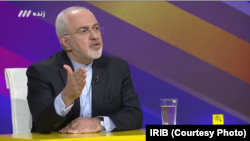Iranian Foreign Minister Mohammad Javad Zarif has drawn a social media backlash from Iranians for saying the pressures they face are a result of the life they have chosen to live.
Zarif made the comment while appearing Sunday on a live Iranian state television talk show. At one point during the program, show host Reza Rashidpour asked Zarif why Iran appears to face more global pressures than other nations.
“We have chosen to live in a different way [compared to other countries],” Zarif replied. “We do not want someone telling us how to live. We want to secure our people’s rights based on our laws. We want a system of government that we prefer.”
By late Monday, Iranian Twitter users posted at least 5,000 tweets with hashtags rejecting Zarif’s assertion that Iran “chose” to live as an Islamist theocracy that has pursued nuclear and other activities that have sparked international criticism and economic sanctions.
An analysis of internationally-trending hashtags using the online tool Trendsmap showed more than 1,000 tweets posted with the Farsi equivalent of the hashtag #I_didn’t_choose, and more than 4,000 tweets with the Farsi equivalent of #We_didn’t_choose.
Among those criticizing Iran’s top diplomat was a Farsi-speaking Twitter user with 24,000 followers who goes by the female name Sadaf.
In the tweet, she wrote, “We haven’t chosen that, Mr Zarif. Our parents and people like you decided for us some 40 years ago, and now they are very regretful. We, young (Iranians) are dreaming about having normal and friendly relations with the world.”
Iran-based journalist Amir Abbas Kalhor, using the “I didn’t choose” Farsi hashtag, responded to Zarif with a tweet saying, “Neither my parents chose you, nor myself and others in my generation, who have not had a referendum or free elections to decide [how we want to be governed].”
Iran’s Islamist leadership seized power in a 1979 revolution that ousted the nation’s ruling monarch, or shah, from power. Since then, Iran has been ruled by unelected clerics known as Supreme Leaders who preside over presidents and parliaments elected by the public from pools of candidates vetted by a Guardian Council of Islamist clerics and jurists.
In another part of Sunday’s talk show, host Rashidpour said Iran has seen little economic benefit from Europe for upholding a 2015 nuclear deal with European and other word powers. In May, U.S. President Donald Trump withdrew from that deal that his predecessor had signed and called for a new one to permanently block Iran from developing nuclear weapons, a goal Tehran denies pursuing.
Zarif responded to Rashidpour’s comment by saying Iran chose to remain in the 2015 deal because doing so entailed the “least cost” to the Iranian people. “It was the hardest choice for us. We had much easier choices, but those choices would have cost the people more,” he said.
Trump reimposed some U.S. economic sanctions on Iran earlier this month as a result of his withdrawal from the 2015 deal. The cost to Iran of the U.S. pressure campaign is set to escalate significantly in November, when the United States has said it will reimpose sanctions on Iran’s central bank and oil exports, the country’s main revenue source.
This report was produced in collaboration with VOA’s Persian Service.




